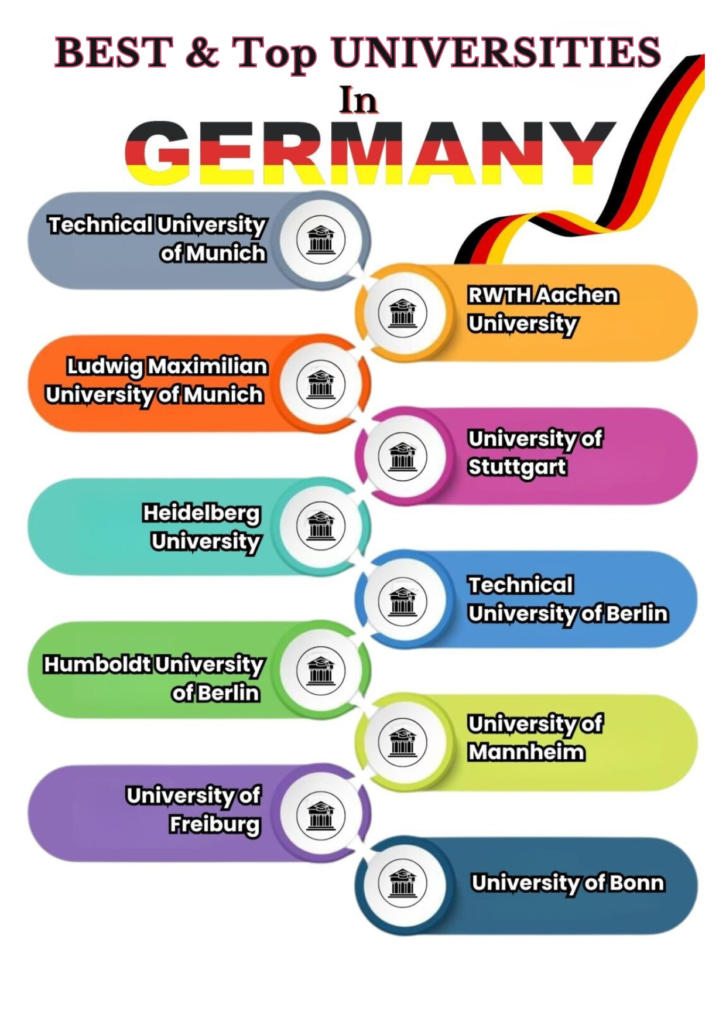
Telangana.India
Send an e-mail
Call Us Now
Want to Study in Germany from Hyderabad? Munu International is one of the Best Germany education consultants in Hyderabad, guiding students to top German universities. If you wish to Study in Germany, we provide personalized counselling, course selection, and complete visa assistance for a successful 2025 intake.

World-Class Education: German universities are renowned for their academic excellence, state-of-the-art research facilities, and focus on innovation. Many consistently rank among the global best, especially in fields like engineering, technology, and the sciences.
Affordable Tuition: Most public universities in Germany charge little to no tuition fees, making high-quality education accessible and budget-friendly for international students.
Diverse and Inclusive Environment: Germany welcomes students from around the world, fostering a multicultural academic community enriched with diverse cultures and perspectives.
Extensive Research Opportunities: As a global leader in research and development, Germany offers students access to cutting-edge technologies and collaborations with esteemed institutes such as the Max Planck Society and Fraunhofer Institutes.
We offer comprehensive support to ensure your journey to studying in Germany is smooth and successful. Our services include:
University Selection:
We help you identify top German universities that suit your academic interests, career goals, and budget.
Course Guidance:
Our experts assist you in selecting the ideal program to match your aspirations and boost your career prospects.
Application Assistance:
From completing applications to crafting a compelling Statement of Purpose (SOP) and preparing required documents, we guide you every step of the way.
Visa Support:
We provide thorough guidance for the German student visa process, including document preparation, interview tips, and timely submissions.
Scholarship Advice:
Learn about available scholarships and financial aid options to make your education in Germany more affordable.
Pre-Departure Orientation:
Prepare for life in Germany with essential advice on housing, transportation, cultural norms, and tips for a seamless transition.
Post-Arrival Support:
We assist you in settling into your new environment, offering help with residence permits, health insurance, and navigating your academic journey in Germany.


Valid Passport – Must be valid for the entire study duration in Germany.
Letter of Admission / Enrollment – From a recognized German university.
Visa Application Form (National Visa D/Student Visa) – Completed online or at the German consulate.
Proof of Financial Means (Blocked Account / Scholarship) – Minimum €11,208 per year to cover living expenses.
Proof of Accommodation – University dormitory booking or rental agreement.
Academic Documents – Certificates, mark sheets, and transcripts.
Language Proficiency – IELTS/TOEFL for English-taught programs, or TestDaF/DSH for German-taught programs.
Passport-Sized Photographs – As per German visa specifications.
Health Insurance – Mandatory for the entire period of stay.
Visa Application Fee – Around €75 (approx. ₹7,000).
Statement of Purpose (SOP) / Motivation Letter – Explaining study goals in Germany.
Police Clearance Certificate – To prove good character.
Consular Interview – May be required at the German Embassy/Consulate.
Here’s a list of Top Germany universities popular among Indian students:
Technical University of Munich (TUM) – Leading in engineering, technology, and natural sciences.
Ludwig Maximilian University of Munich (LMU) – Known for arts, humanities, and sciences.
Heidelberg University – Strong in medicine, life sciences, and research.
Humboldt University of Berlin – Famous for humanities, social sciences, and natural sciences.
University of Freiburg – Offers programs in engineering, science, and humanities.
RWTH Aachen University – Renowned for engineering and technical programs.
University of Stuttgart – Popular for mechanical, automotive, and electrical engineering.
Technical University of Berlin (TU Berlin) – Strong in technology, IT, and engineering.
University of Mannheim – Known for business, economics, and social sciences.
University of Bonn – Offers programs in natural sciences, economics, and mathematics.

Many universities offer programs in English, especially at the master's and doctoral levels. However, some programs and daily life interactions may require knowledge of basic German. It's advisable to check the language requirements of your chosen program and university.
Tuition fees vary depending on whether you're studying at a public or private university and your nationality. Most public universities in Germany offer low to no tuition fees for international students, while private universities may have higher costs.
You can apply directly to your chosen universities through their application portals. Each university has its own application process and deadlines, so make sure to research and follow their instructions carefully.
Entry requirements vary between programs and universities. Generally, you'll need to submit your academic transcripts, language proficiency test scores (e.g., IELTS, TOEFL, TestDaF), letters of recommendation, and a statement of purpose. For more information contact Munu International, Hyderabad for best admission process to Germany
Yes, international students are allowed to work part-time during their studies in Germany. Non-EU/EEA students are typically allowed to work up to 120 full days or 240 half days per year.
The cost of living in Germany depends on the city and your lifestyle. On average, students need around €800 to €1,000 per month to cover expenses like accommodation, food, transportation, health insurance, and leisure activities.
Yes, health insurance is mandatory for all students in Germany. You can either get public health insurance or private health insurance. Many universities have partnerships with specific insurance providers to make the process easier.
Yes, Germany offers a "Post-Study Work" option that allows international students to stay in the country for up to 18 months after graduation to search for a job related to their field of study.
There are various scholarships available for international students in Germany, offered by the German government, DAAD, universities, and other organizations. Check the DAAD scholarship database for information on available funding opportunities. Contact Munu International for best scholarship options in Germany.
Universities often provide assistance in finding accommodation, including dormitories or student residences. You can also look for private apartments or shared flats (WG) through online platforms and local listings. After get the visa Munu International will guide in best accommodation options.
If you're a non-EU/EEA student, you'll likely need a student visa to study in Germany. Check with the German embassy or consulate in your home country for visa requirements and application procedures.
Yes, you can bring your family to Germany, but there are specific requirements and regulations for this. You'll need to provide proof of sufficient funds to support your family members and meet certain conditions.
Remember: though documents may assist you in your interview, the Consular Officer relies primarily on the interview to determine your eligibility for a visa, and only minimally on supporting documents As for the documents you do submit with your application, there are no specific documents that prove a student is able to pay for his/her education. Bank account statements, pay slips, income tax return statements, employment letters, property documents and chartered accountant statements are the most common documents used to show proof of funds. However, these are only suggested documents. A visa is not assured if you have any or all of these documents.
For students aspiring to study in the USA, UK, Canada, Australia, or Germany, Munu International offers value-added services. For more information and early-bird discounts, contact us.
Munu International stands out as a prominent consultancy specializing in global education, committed to guiding Indian students in realizing their academic ambitions on the international front. Our resolute dedication to excellence and an enduring enthusiasm for education have established us as a reliable partner in helping students pursue their overseas study dreams.
Flat no:101, First Floor, Ameer Estate,
beside S.R. Nagar Bus stop, Ameerpet, Hyderabad-500038
Opp.Metro Pillar -1038
Copyright © 2023, All Rights Reserved By Munu International | Powered by Sky High Digitals